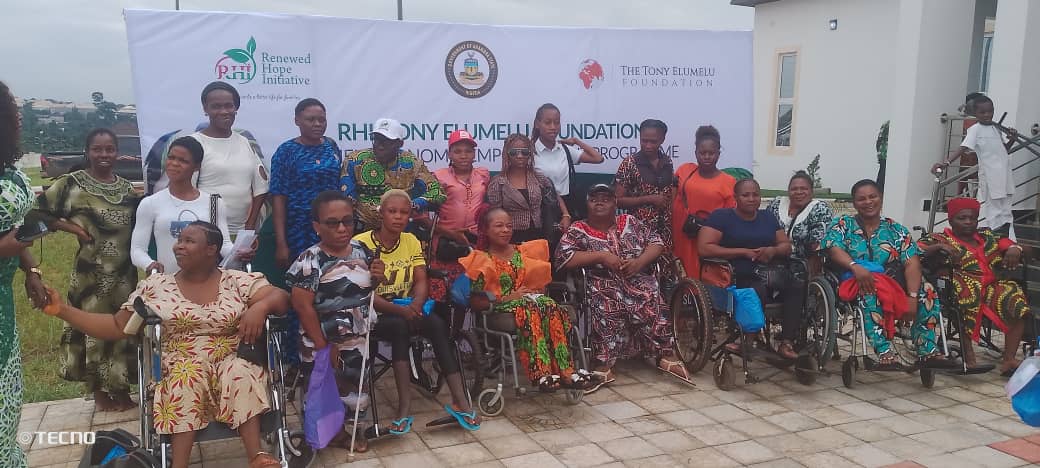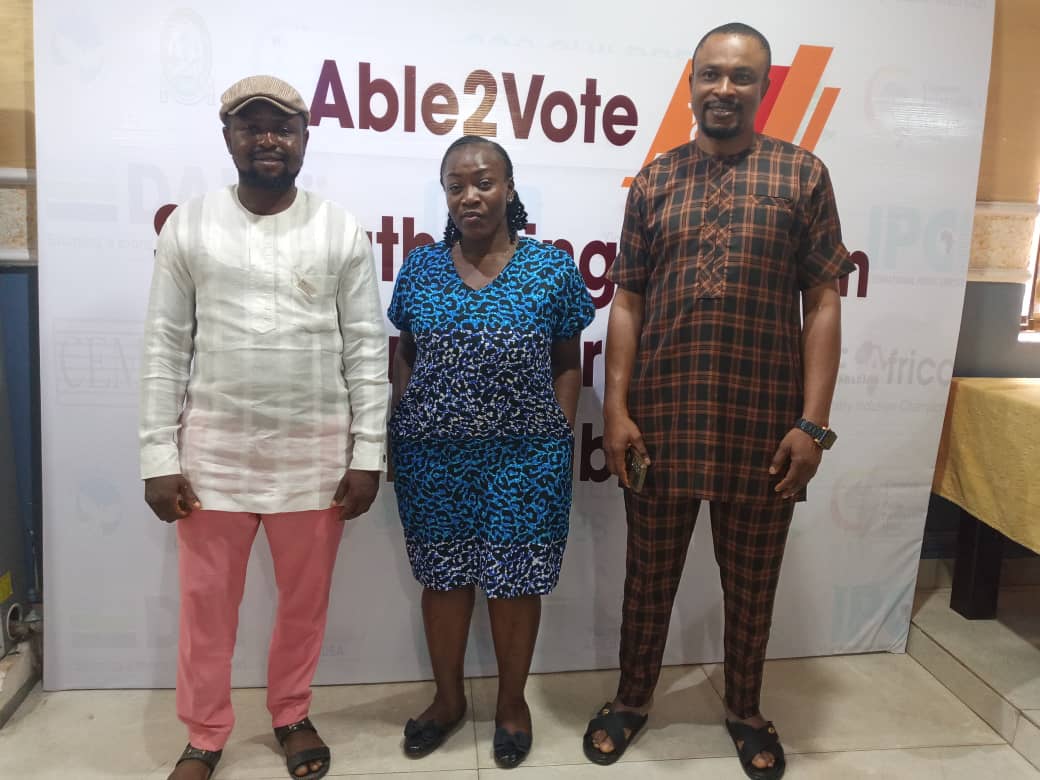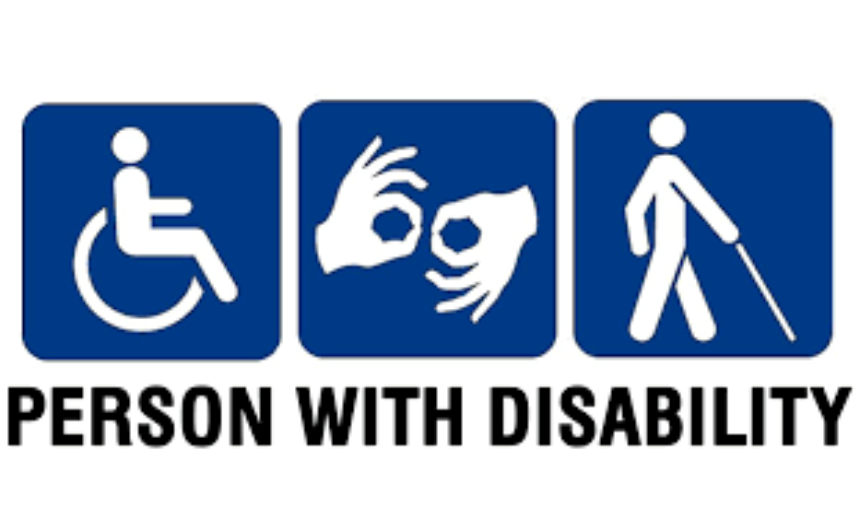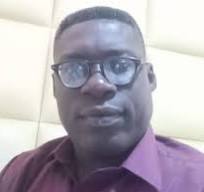Alfred Ajayi
Every election season in Anambra, the promise of democracy collides with a harsh reality for thousands of citizens living with disabilities. For persons with hearing impairment, voting is less an act of civic duty than a reminder of exclusion while voters with visual impairment either depend on their own aide or strangers, exposing them to manipulation and stripping them of the dignity of secret ballots.
Persons with albinism, too, are not spared. Under the scorching sun, many develop painful burns while waiting in queues, and despite repeated promises, magnifying glasses to aid their vision have never appeared at polling units.
Ahead of the November 8 gubernatorial election in Anambra State, Alfred Ajayi x-rays various issues of exclusion and brings the PWDs’ simple but urgent call for a voting system that recognizes their rights, meets their needs, and allows them to participate in democracy as equal stakeholders.
Silence deeper than deafness
At every election season, Ndubueze Ezemba makes his way to the polling unit with a sense of hope, only to be met with silence that runs deeper than his own.
As leader of the Association for the Deaf in Anambra State, Ezemba says voting is often an exercise in exclusion for him and his members.
Speaking through a sign language interpreter, the young man in his late 30s or early 40s lamented that in all his years of voting, he has never seen an interpreter at his polling unit to guide deaf voters through the process.
“It’s quite frustrating,” he said. “INEC needs to deploy interpreters to polling units during voting time, whether the deaf are there or not.”
For Ezemba, the problem begins long before election day. Without proper registration data or targeted voter education, deaf citizens remain on the margins of Nigeria’s democracy, their voices stifled not by apathy, but by the system that has remained largely exclusive.
Ezemba is among the estimated 1.3 world population with some form of disability out the world’s 8 billion people (16% of the world’s population and roughly 1 in 6 people), according to the World Health Organization, (WHO) in 2023.
The blind not spared
For Ernest Okanmelu, Chairman of the Association of the Blind in Anambra State, the experience is no less discouraging.
Without braille ballot papers, blind voters rely on others to mark their choices, often at the risk of manipulation.
“Sometimes, when they give you someone to help, the person takes advantage of your blindness and votes for his own candidate instead of yours,” he explained.
Even when accompanied by assistants, officials rarely allow them to vote together, forcing delays and stripping away the dignity of preferential treatment promised by INEC.
Both leaders paint a picture of an electoral process that, despite gradual reforms, still sidelines persons with disabilities.
From inaccessible polling booths and costly travel to the absence of tailored voter education, the barriers remain steep.
Their stories highlight not just personal struggles but a broader systemic failure to treat PWDs as equal stakeholders in Nigeria’s democracy.
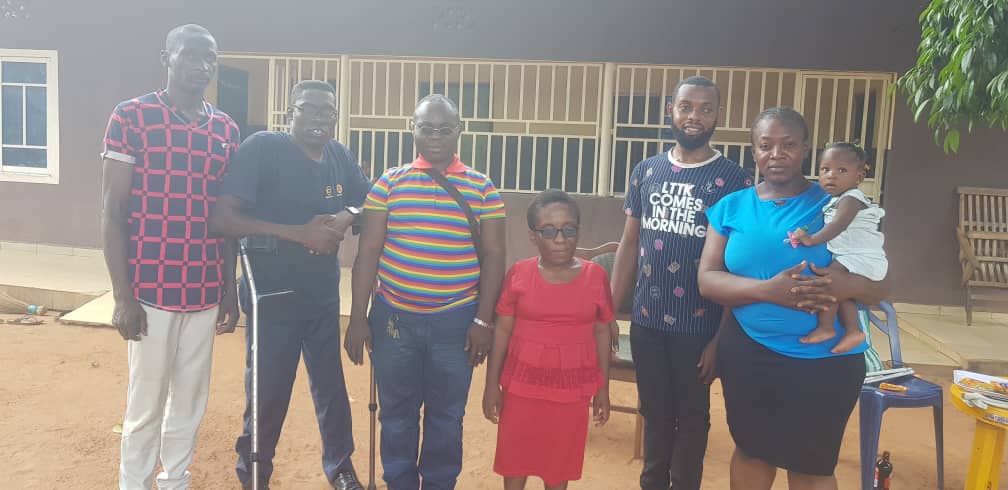
“INEC needs to educate and sensitize us as bona fide citizens of Nigeria,” Ezemba insists. Okanmelu agrees, adding, “If braille ballot papers, accessible polling units, and security are provided, more of our members will come out to vote.”
No magnifying glasses
For Ben Orizu, election day is not only about casting a vote but also a battle with the sun. As State Chairman of the Association of Persons with Albinism in Anambra, he says the greatest obstacle his members face is the harsh ultraviolet rays that beat down on them while they wait in long queues.
“We naturally have issues with the sun,” he explained. “Most times, our members do not enjoy the preferential treatment the law provides.
Ideally, they should allow us to do accreditation and vote immediately we arrive so the effect of the sun will not be too much on us.”
The danger is not minor discomfort. For persons with albinism, long exposure to the sun leaves painful dark spots on the skin and, in the long term, can trigger skin cancer. Between 11 a.m. and 4 p.m., the hours when voting usually drags on, the risk is at its highest.
Beyond the sun, Orizu points to another overlooked need: magnifying lenses. These would help voters with albinism clearly see the names and logos on ballot papers.

“I’m 32 now, and since I started voting, I have never seen a magnifier in any polling unit. I even asked others with albinism, and none has ever seen one.”
Willing and able to vote
For him, these simple provisions would make a world of difference. “If such equipment is available, it will increase our inclusion. We are willing and happy to vote, but we need support.”
“Too often, he said, persons with albinism face dismissive comments or bullying at polling units. INEC staff or security agents ask – ‘What are you doing here?’ as if we don’t belong.”
According to WHO, some persons with disabilities face many health inequities arising from unfair conditions including stigma, discrimination, poverty, as well as exclusion from education and employment. Besides, PWDs find inaccessible and unaffordable transportation 15 times more difficult than those without disabilities.
Most PWDs in Anambra and across Nigeria have had their fate compounded with electoral exclusion in due to inaccessible polling units or voting cubicles and lack of assistive equipment that can make their participation easy and seamless.
Things are improving
Commenting on the topic, Ugochukwu Okeke, Chairman, Joint National Association of Persons with Disability, (JONAPWD) Anambra State Chapter, acknowledged the challenges but expressed joy that the situation is fast improving.
Before now, persons with disabilities (PWDs) faced enormous challenges in elections. Registration centers were often inaccessible, crowded, and without priority consideration for PWDs. As a result, very few had PVCs, and fewer could actually vote.

“Polling units were far away and difficult to reach. For the blind, deaf, and those with physical disabilities, the process was nearly impossible. The process disenfranchised them.
“Things have gradually changed. INEC now collaborates with our coordinators at the local government level, setting aside days for members to register. This has improved participation.
“At polling units, PWDs, elderly persons, and pregnant women now enjoy priority attention. INEC also introduced braille ballot papers for the visually impaired, binocular lenses for persons with albinism, and made polling booths more accessible to those with mobility challenges.
“Security agencies no longer obstruct movement of vehicles carrying PWDs, while INEC has created new polling units, reducing travel distances.
INEC has also brailled voter education materials, though not in sufficient quantity due to cost.
Data still lacking
INEC equally lacks the data that can enable it to prepare adequately for persons with disability.
Okeke attested to this. “The main challenge remains lack of data on PWD voters and their specific disabilities, making it difficult for INEC to deploy resources like interpreters where necessary.
“To close this gap, we have started capturing data on our members and will present it to INEC ahead of the November election to guide planning and budgeting.
JONAPWD Chairman alsl drew attention to the poor awareness among INEC ad-hoc staff about disability issues and forms like EC40H.
“Many lack basic disability etiquette, sometimes using offensive language. INEC must incorporate disability sensitivity into its training.
“Insecurity is another barrier, as security agencies rarely assure PWDs of safety. Yet, perceptions are changing.
“Today, more people recognize us as stakeholders, and even at polling units, citizens willingly give us space to vote first.
Happily, Okeke in a post on his facebook on Friday, September 12, 2025 revealed that the security agencies in the state have pledged to offer protection to persons with disability during the gubernatorial election.
He said, “Security Agencies have assured Ndị Anambra with disabilities of their maximum security before, during and after election.

“Our expectations after Anambra State governorship election in November 8, 2025 is 25% increase on the number of persons with disabilities that will participate in that election.
“I and my team in JONAPWD will never get tired in advocating for inclusive electoral processes in Nigeria. The mandate is in our hands,” he said.
Legal instruments
Section 54 (1) of the Electoral Act of 2022 permits that “a voter with visual impairment or other form of disability who is otherwise unable to distinguish symbol or who suffers from any other physical disability may be accompanied into the polling unit by a person chosen by him or her and that person shall, after informing the Presiding officer of the disability, be permitted to accompany the voter into the voting compartment and assist the voter to make his or her mark in accordance with the procedure prescribed by the Commission.
The section equally provides that the Commission shall take reasonable steps to assist persons with disabilities, special needs and vulnerable persons at the polling place by the provision of suitable means of communication, such as Braille, large embossed print, electronic devices, sign language interpretation, or offsite voting in appropriate cases.
The 1999 constitution also forbidding discrimination in all its forms gives every citizen freedom from discrimination. It states that a citizen cannot be discriminated against solely because of community, ethnic origin, sex, religion, or political opinion.
UDHR prohibits exclusion
The Universal Declaration of Human Rights (UDHR), adopted by the United Nations General Assembly in 1948, strongly prohibits discrimination in all its forms. Its Article 1 says that “All human beings are born free and equal in dignity and rights.”
According to Article 2, “Everyone is entitled to all the rights and freedoms set forth in this Declaration, without distinction of any kind, such as race, colour, sex, language, religion, political or other opinion, national or social origin, property, birth or other status.”
This explicitly prohibits discrimination and makes clear that rights apply to all people, everywhere, while Article 7 says that “All are equal before the law and are entitled without any discrimination to equal protection of the law.”
Despite these provisions, voters with disabilities in Anambra are still hoping to get relief from their effective implementation.
INEC pledges inclusion
Responding to Radio Nigeria’s posers, Head of Unit, Civil Society Organizations/PWD Desk Officer, INEC Anambra State, Mrs Vivian Ukamaka Eya, said the commission is not unaware of the challenges facing PWDs during voting,
“INEC is fully aware of the difficulties persons with disabilities face during elections, and we are making frantic efforts to make voting accessible for all. To achieve this, the Commission has set up Disability Desks across the states, including Anambra, to directly engage with disability groups and provide solutions.
“We have moved polling units from difficult locations to public centres such as schools and community halls to make access easier. On election day, PWDs, elderly citizens, and pregnant women enjoy priority voting, so they do not spend long hours in queues.
Assistive materials for Anambra guber polls
She specifically assured that assistive materials will be available for voters with disabilities during the guber polls in Anambra.
“We have also introduced assistive materials like braille ballot guides for the blind, magnifying glasses for persons with albinism, and large-font posters for voters with low vision. These will be available in Anambra and across Nigeria.
INEC wishes to assure all voters with disabilities that we will not leave them behind. Our goal is to guarantee an inclusive voting process where every Nigerian, regardless of disability, can exercise their franchise with dignity and without difficulty.”
“The Honourable Resident Electoral Commissioner for Anambra State, Queen Elizabeth Agwu, has also emphasized her commitment to humanity. She has assured that she will continue to do everything possible to ensure a safe and inclusive electoral process.
“The massive turnout of Persons with Disabilities during the by-election held on the 16th of August is a clear sign that these efforts are yielding results and that inclusion is becoming a reality,” Eya submitted.
Nigeria’s democracy cannot be complete while citizens with disabilities are shut out of the ballot. INEC, political parties, civil society, and the wider public must move beyond token promises and ensure that inclusive measures are not only on paper but fully implemented at polling units.
From interpreters for the deaf, braille ballot guides for the blind, magnifiers for persons with albinism, to accessible polling booths for those with mobility challenges—these are not privileges, but rights guaranteed under the law.
As Anambra heads into the November 2025 governorship election, the time to act is now. Policymakers, election officials, and security agencies must prioritize accessibility and dignity for all voters.
Citizens, too, have a duty to reject discrimination and give space for inclusivity. Only then can the ballot truly reflect the voices of every Nigerian, regardless of ability.


